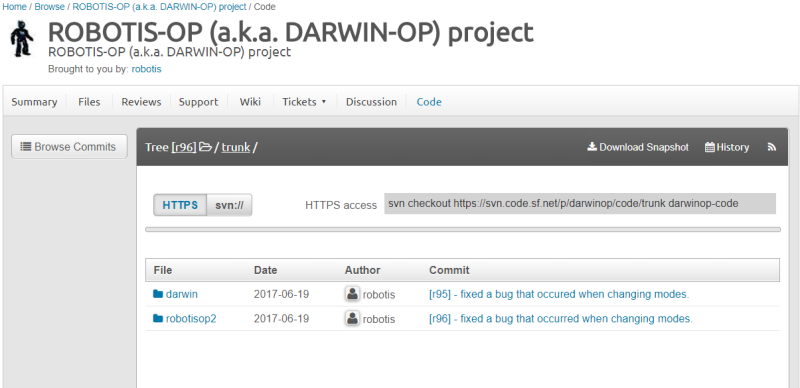This is an old revision of the document!
Table of Contents
How To Add a New Mode to Darwin OP 2
Author: Yu Hang He Email: hey6@unlv.nevada.edu
Date: Last modified on <11/18/17>
Keywords: Darwin OP 2, C++/C Programming, New Mode
This tutorial will demonstrate how to add a new mode to Darwin OP 2's demo program. The new mode will be added alongside Autonomous Soccer, Interactive Motion, and Vision Processing mode. After starting program, use mode button on the back of Darwin OP 2 to cycle through modes and press start button to start the new mode.It takes approximately 1 hour to complete.
Motivation and Audience
This tutorial's motivation is to demonstrate a process to quickly implement and test new codes on Darwin OP 2. This tutorial assumes the reader has the following background and interests:
* Familiar with handling Darwin OP 2
* Familiar with C++/C programming language
* Familiar with C++/C codes on Darwin OP 2
The rest of this tutorial is presented as follows:
Source Code
It is always recommended to modify a copy of Darwin OP's source code instead of editing the source code directly.
A link to download the source code can be found at Robotis' Sourceforge.
Click on Download Snapshot in upper right corner to download the source code.
The codes for demonstration program can be found under robotisop2/Linux/project/demo.
main.cpp, StatusCheck.cpp, and StatusCheck.h will be modified to implement the new mode.
Programming
This tutorial will only demonstrate parts of program that needs modification to include a new mode.
- | StatusCheck.h
//Line 16 enum { INITIAL, READY, SOCCER, MOTION, VISION, NEW_MODE, //Add a new mode called "NEW_MODE" to an enumerated list of modes MAX_MODE };
- | StatusCheck.cpp
//At the end of if statement Line 141 if(m_old_btn & BTN_MODE) /////////////////////////// ////////////////////////// ////////////////////////// else if(m_cur_mode == SPRINT) //adding LED and play mp3 for new mode { cm730.WriteByte(CM730::P_LED_PANNEL, 0x01|0x04, NULL); //Signaling Darwin OP 2 which LED to turn on LinuxActionScript::PlayMP3("../../../Data/mp3/New_Mode mode.mp3"); //play an mp3 file (you can use any mp3 file but make sure file name matches) } } // Line 267 Add else if(m_cur_mode == NEW_MODE) { MotionManager::GetInstance()->Reinitialize(); MotionManager::GetInstance()->SetEnable(true); //initialize and enable MotionManager class m_is_started = 1; LinuxActionScript::PlayMP3("../../../Data/mp3/Start New_Mode demonstration.mp3"); //play an mp3 file (you can use any mp3 file but make sure file name matches) // Joint Enable... Action::GetInstance()->m_Joint.SetEnableBody(true, true); Action::GetInstance()->Start(9); while(Action::GetInstance()->IsRunning() == true) usleep(8000); Head::GetInstance()->m_Joint.SetEnableHeadOnly(true, true); Walking::GetInstance()->m_Joint.SetEnableBodyWithoutHead(true, true); //Reset Gyro sensor MotionManager::GetInstance()->ResetGyroCalibration(); while(1) { if(MotionManager::GetInstance()->GetCalibrationStatus() == 1) { LinuxActionScript::PlayMP3("../../../Data/mp3/Sensor calibration complete.mp3"); break; } else if(MotionManager::GetInstance()->GetCalibrationStatus() == -1) { LinuxActionScript::PlayMP3Wait("../../../Data/mp3/Sensor calibration fail.mp3"); MotionManager::GetInstance()->ResetGyroCalibration(); } usleep(8000); } //copied status check condition from soccer mode to new mode //These codes initialize Darwin OP 2 for movement and walking
- | main.cpp
//L317 Add case New_Mode: //implement new codes here to execute after pressing start button
Final Words
This tutorial's objective was to <fill in the blank>. Complete <choose: construction details, source code and program descriptions> for <fill in the blank>. Once the concepts were conveyed the reader could <fill in the blank>.
Speculating future work derived from this tutorial, includes <fill in the blank>. In the big picture, the problem of <fill in the blank> can be solved with this tutorial.
For questions, clarifications, etc, Email: paul.oh@unlv.edu

